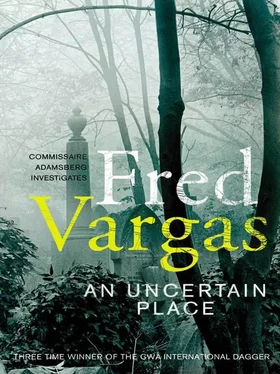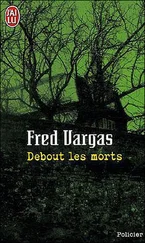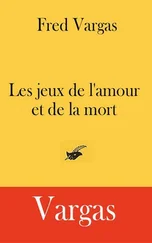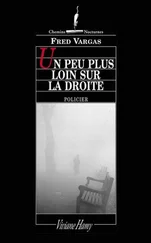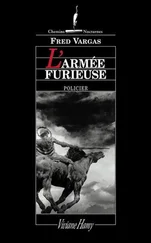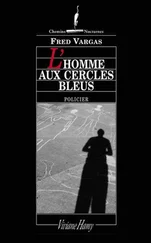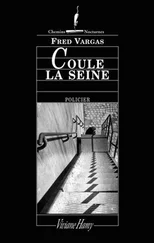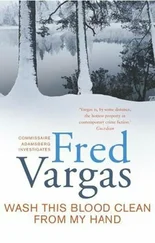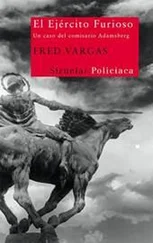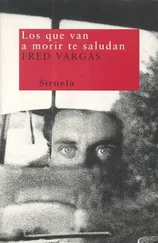‘Is that really possible?’ asked Estalère, gripping the plastic cup.
‘It’s what happened in any case. She had the “rosy glow” of the living – in fact, she was rosier than ever. It was described by witnesses, I’m not making this up.’
‘But the coffin was normal? Just a wooden one?’
‘Yes. And the miraculous conservation of Lizzie Siddal caused a big scandal in England and beyond. People immediately started connecting it with the Master – the Highgate Vampire – and saying he had taken possession of the cemetery. There were ceremonies, people saw apparitions, they chanted incantations to the Master. From that time, the catacomb was open.’
‘So people went in.’
‘They certainly did, thousands of them. Until the two girls who were followed, more recently.’
The train braked, as they approached the Gare du Nord. Adamsberg sat up, shook out his jacket which he had rolled into a ball, and patted down his hair.
‘And what’s Stock’s connection to all that?’ he asked.
‘Radstock was part of a team of policemen sent up there when they heard about the exorcism sessions in the 1970s. He saw the preserved body of the man, and he heard the exorcist addressing the vampire. I guess he was young and impressionable at the time. And then finding these dead people’s feet in the same place the other day must have upset him a lot. Because they say the Entity – or the Vampire if you like – still reigns in the dark reaches of Highgate.’
‘Is that why you talked about an offering?’ asked Estalère. ‘The foot-chopper was making an offering to the Entity?’
‘That’s what Radstock thinks. He’s afraid some madman wants to start the whole nightmare up again, and “revive” the powers of the sleeping Master. But I guess it isn’t really likely. The foot-chopper wants to offload his collection, right? He can’t just chuck it all in the bin, any more than we can bear to throw away our childhood toys. He wants to find a suitable place for them.’
‘And he chooses a place worthy of his fantasies,’ said Adamsberg. ‘He chooses Higg-Gate, where the feet could go on living.’
‘Highgate,’ Danglard corrected. ‘It doesn’t necessarily mean the foot-chopper believes in the Vampire. It’s the character of the place that counts. Well, anyway, all that’s well behind us now, and on the other side of the Channel.’
The train pulled in to the platform and Danglard seized his bag brusquely, as if to mark with a decisive action an end to the numbing effect of his story.
‘But when you’ve seen something like that,’ said Adamsberg softly, ‘a bit of it sticks and stays inside you. Any experience that’s too beautiful or too horrific always leaves some fragment of itself in the eyes of people who have witnessed it. We know that. In fact, that’s how you recognise it.’
‘Recognise what?’
‘Something either overwhelmingly beautiful or overwhelmingly terrible, Estalère. You recognise it by the shock, the little splinter that remains.’
As they walked back up the platform, Estalère tapped the commissaire on the shoulder, Danglard having parted from them in haste, as if regretting having said too much.
‘The little fragments of things we’ve seen, what happens to them?’
‘You put them away, you scatter them like stars in the big box we call memory.’
‘You can’t get rid of them?’
‘No, that’s not possible, the memory doesn’t have a compartment marked trash.’
‘So what happens if we don’t like them?’
‘Either you have to lie in wait for them and destroy them, like Danglard, or you leave them well alone.’
In the metro, Adamsberg wondered in which compartment of his memory the ghastly feet in London were going to lodge, on which galaxy of stars, and how long it would take for him to think he had forgotten them. And come to that, where would the wardrobe man go, or the bear and the uncle, or the girls who had seen the vampire and were trying to get back to him? What had happened to the one who had gone to the catacomb? And the exorcist?
Adamsberg rubbed his eyes, looking forward to getting a good night’s sleep. Ten hours, why not? But in the event, he got only six hours.
SEVEN THIRTY NEXT MORNING. THE COMMISSAIRE , THUNDERSTRUCK, was sitting on a chair, and gazing at the crime scene, under the anxious eyes of his colleagues – so abnormal was it for Adamsberg to be thunderstruck, or indeed to be sitting on a chair. But he remained where he was, his face expressionless, and his eyes darting around, as if he had no wish to see, and was projecting his gaze far away so that nothing should lodge in his memory. He was forcing himself to think back, to 6 a.m., when he had not yet seen this room drenched in blood. When he had been dressing quickly, after the phone call from Lieutenant Justin, putting on the white shirt from the day before and the elegant black jacket lent to him by Danglard, both of them completely inappropriate to the situation. Justin’s choked voice had foretold nothing good; it was the voice of someone who was sick to the stomach.
‘We’re using all the platforms,’ he had said. That meant the plastic stands which were put on the ground to prevent any contamination of a crime scene by people’s feet. ‘All the platforms’. That meant the whole surface of the crime scene could not be trodden on. Adamsberg had left home hurriedly, avoiding Lucio, the tool shed, and the cat. Up to that point, he had been quite all right, he had not yet entered that room, he had not yet sat down on this chair, in front of carpets soaked in blood and strewn with entrails and splinters of bone, between four walls spattered with organic matter. It was as if the old man’s body had literally exploded. The most revolting thing was perhaps the scraps of flesh on the black shining lid of the half-size grand piano, as if on a butcher’s slab. Blood had also dripped on to the keys. This was another phenomenon for which there was no word: someone had reduced the body of another man to mincemeat. The word ‘killer’ was inadequate and derisory.
Leaving the house, he had called up his most trusty lieutenant , Retancourt, who in his view was the person best able to stand up to anything under creation. To thwart or redirect things as she wished.
‘Retancourt, get over there to Justin, they’ve got all the platforms out. I don’t know what’s happened. The address is a villa on a private road in Garches, leafy suburb, old man, and apparently an indescribable scene in the house. From Justin’s voice it sounded really bad. Fast as you can.’
With Retancourt, Adamsberg alternated between ‘ tu ’ and ‘ vous ’ without thinking about it. Her first name was Violette, an unlikely one for a woman who stood over 1m 80 and weighed 110 kilos. Adamsberg called her by her first name, or her surname, or her rank, depending on which was uppermost in his mind: his respect for her enigmatic abilities or his warm appreciation for the safe refuge she offered him – when she was so moved, and if she was so moved. This morning he was waiting for her, in a passive state, making time stand still, while his men spoke in low voices in the room and the blood dried on the walls. Perhaps she had been held up by something crossing her path. He heard Retancourt’s heavy tread before he saw her.
‘Bloody tailback all the way down the boulevard,’ Retancourt was grumbling. She did not appreciate being held up.
Despite her remarkable size, she trod nimbly over the platforms and sat down heavily at his side. Adamsberg gave her a grateful smile. Did she know that to him she represented his tree of salvation, a tree with tough and miraculous fruit, the kind of tree you put your arms round without being able to encircle it, the kind of tree you climb up into when the mouth of hell opens? You build yourself a tree house in its highest branches. She had the strength, the ruggedness and the self-contained quality of a tree concealing a monumental mystery. Her shrewd gaze now took in the room, the floor, the walls, the men.
Читать дальше
